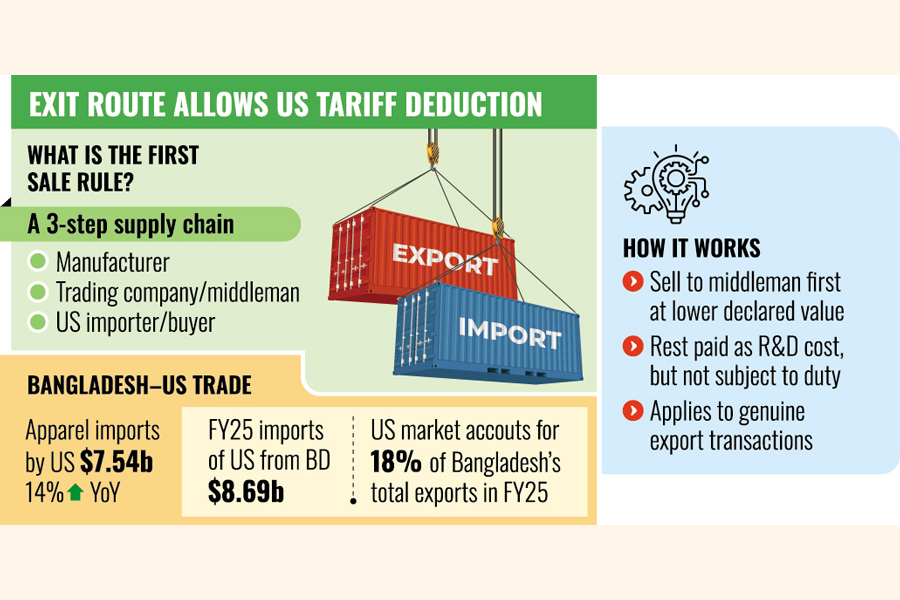EXIT ROUTE ALLOWS US TARIFF DEDUCTION
Apparel exporters eye 'first sale' rule to boost competitiveness
Rule allows importer to pay 15-20pc lowered landed duty on product value

Published :
Updated :

Bangladeshi apparel exporters are exploring the 'First Sale' window of opportunity in the United States to help their buyers and retailers secure lower tariffs and thus enhance their export competitiveness on the high-duty US market.
In the American customs law, the first-sale rule allows an importer to pay 15-to 20-percent lowered landed duty through declared lowered value of goods based on the manufacturer's price through a multi-tiered transaction -- such as manufacturer to middleman to US importer -- rather than the final price paid by the US buyer.
Garment exporters in the know say this rule helps them avoid high tariffs. The rest of the price is paid as a research and development cost to the manufacturers, but this requires the involvement of another entity.
In a letter to the Ministry of Commerce, Bangladesh Garment Manufacturers and Exporters Association (BGMEA) has noted that the first-sale method is becoming increasingly popular among US buyers. The letter also mentions that a recent survey found major retail groups, such as PVH, VF, Kontoor Brands, AEO, Kohl's, and JCPenney, source a significant portion of their total purchases through this duty-deduction conduit.
All top American retailers are using this first-sale marketing programme, according to a source. "It includes all of the retailers like Calvin Klein, GAP, Levi's, C&A, American Eagle, Ann Taylor, and so on. Walmart, Costco, and a few others also use it."
Industry leaders mention that among the high-value-product exporters to the US market, Sparrow Group, Hameem Group, Viyellatex Group and Standard Group are doing business under these rules.
Industry-insiders say this approach can significantly reduce the declared customs value, which in turn cuts import duties and landed costs for US buyers.
For example, if a manufacturer sells goods to a trading company at $10 per unit, and those goods are sent
through another entity of the manufacturer, the US government allows them to reduce duties under the first-sale rule, which would be calculated on $8 instead of $10.
The remaining $2 would be calculated and paid as a research and development cost. They note that the resulting duty savings can make US retail prices more competitive, improve importers' profit margins, and free up working capital.
However, they also caution that the first-sale option comes with strict requirements under US Customs and Border Protection (CBP) regulations.
The first sale must be a genuine transaction for export to the United States, and the buyer and the seller must be independent or demonstrate that the price reflects market value. Goods must remain essentially the same after the first sale, aside from minor handling or repackaging, and exporters must maintain a clear documentation trail, including contracts, invoices, payment records, and shipping documents, to prove eligibility.
The strings binding the duty benefit also provide that first-sale value must also be declared at the time of import, with supporting papers available for CBP review.
Exporters believe with proper documentation and transaction structuring, Bangladeshi manufacturers can leverage the first-sale rule to strengthen partnerships with US buyers and potentially secure more orders on the price-sensitive American retail market.
Talking to the Financial Express, Shovon Islam, Managing Director of the Sparrow Group, said, "We have been doing business for the last 12 years under First Sale rules. This helps our buyers to be more competitive as it allows them to pay a lower rate of landed duty."
Islam adds that all of their large and reputable buyers are doing business under First Sale rules. "However, the product should be a high-value item," he explains. "For example, the FOB price should be above $8."
He notes that companies with multinational operations can do this easily, with the rest of the value being paid as an R&D cost.
"Lowering the product landed duty depends on the product category and its value. Generally, 10 per cent to 15 per cent is standard, and 20 per cent is the absolute maximum slab," he mentions.
"It's being audited by USA customs and top 3rd-party Accounting Firms regularly," says Shovon Islam, a former director of BGMEA.
BGMEA raises concern over cash incentives for 'first-sale' exports
The BGMEA letter to the trade body carries concern over cash incentives for exports under the First-Sale method. It states that the main condition binding this process is that the factory receiving the purchase order must produce the goods in another factory before exporting.
President of BKMEA Mohammad Hatem told the FE that one of their largest exporters faced difficulties getting cash incentives after exporting under First-Sale rules, even though those goods were produced in another unit of that company.
The goods were manufactured in another unit after getting buyer's approval, he said, adding: "We urged the government to allow such exporters for cash incentives."
Hatem adds: the government should clarify the rules for getting cash incentives on first-sale exports, especially when an exporter has to produce goods in another unit of the company. "Otherwise, trading companies will try to get cash incentives."
According to the latest data from the Export Promotion Bureau (EPB), Bangladesh's total exports to the United States came to $8.69 billion during the past July-June period -- a notable increase from $7.60 billion a year earlier. Apparel exports to the US in the last fiscal year were worth $7.54 billion, representing a 14-percent year-on-year growth.
The US market accounted for over 18per cent of Bangladesh's total export earnings of $48.28 billion in FY25.
newsmanjasi@gmail.com


 For all latest news, follow The Financial Express Google News channel.
For all latest news, follow The Financial Express Google News channel.